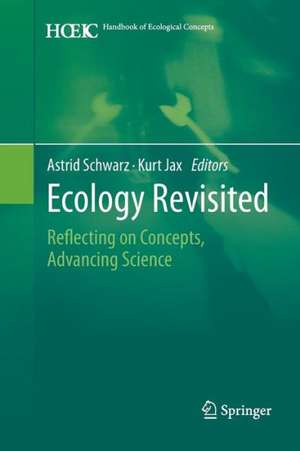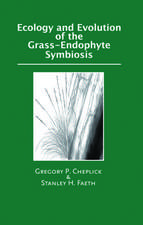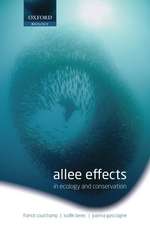Ecology Revisited: Reflecting on Concepts, Advancing Science
Editat de Astrid Schwarz, Kurt Jaxen Limba Engleză Paperback – 6 noi 2014
The study of ‘ecological’ phenomena has never been confined solely to the work of researchers who consider themselves ecologists. It is rather a field of knowledge in which a plurality of practices, concepts and theories are developed. Thus, there exist numerous disciplinary subdivisions and research programmes within the field, the boundaries of which remain blurred. As a consequence, the deliberation to adequately identify the ecological field of knowledge, its epistemic and institutional setting, is still going on. This will be of central importance not only in locating ecology in the frame of 21st century environmental sciences but also for a better understanding of how nature and culture are intertwined in debates about pressing problems, such as climate change, the protection of species diversity, or the management of renewable resources.
| Toate formatele și edițiile | Preț | Express |
|---|---|---|
| Paperback (1) | 1279.31 lei 6-8 săpt. | |
| SPRINGER NETHERLANDS – 6 noi 2014 | 1279.31 lei 6-8 săpt. | |
| Hardback (1) | 1394.84 lei 6-8 săpt. | |
| SPRINGER NETHERLANDS – 23 mar 2011 | 1394.84 lei 6-8 săpt. |
Preț: 1279.31 lei
Preț vechi: 1560.13 lei
-18% Nou
Puncte Express: 1919
Preț estimativ în valută:
244.82€ • 265.84$ • 205.65£
244.82€ • 265.84$ • 205.65£
Carte tipărită la comandă
Livrare economică 23 aprilie-07 mai
Preluare comenzi: 021 569.72.76
Specificații
ISBN-13: 9789400797383
ISBN-10: 9400797389
Pagini: 464
Ilustrații: XIX, 444 p.
Dimensiuni: 155 x 235 x 24 mm
Greutate: 0.65 kg
Ediția:2011
Editura: SPRINGER NETHERLANDS
Colecția Springer
Locul publicării:Dordrecht, Netherlands
ISBN-10: 9400797389
Pagini: 464
Ilustrații: XIX, 444 p.
Dimensiuni: 155 x 235 x 24 mm
Greutate: 0.65 kg
Ediția:2011
Editura: SPRINGER NETHERLANDS
Colecția Springer
Locul publicării:Dordrecht, Netherlands
Public țintă
Professional/practitionerCuprins
1. Why Write a Handbook of Ecological Concepts? A. Schwarz, K. Jax
2, Structure of the Handbook; K. Jax, A. Schwarz
3. History of Concepts for Ecology; A. Schwarz
4. Multifaceted Ecology Between Organicism, Emergentism and Reductionism; D. Bergandi
5. The Classical Holism-Reductionism Debate in Ecology; L. Trepl, A. Voigt
6. Conceptualizing the Heterogeneity, Embeddedness, and Ongoing Restructuring That Make Ecological Complexity ‘Unruly’; P. Taylor
7. A Few Theses Regarding the Inner Structure of Ecology; G. Wiegleb
8. Dynamics in the Formation of Ecological Knowledge; A. Schwarz
9. Etymology and Original Sources of the Term “Ecology”; A. Schwarz, K. Jax
10. The Early Period of Word and Concept Formation; K. Jax, A. Schwarz
11. Competing Terms; K. Jax, A. Schwarz
12. Stabilizing a Concept; K. Jax
13. Formation of Scientific Societies; K. Jax
14. The Fundamental Subdivisions of Ecology; K. Jax, A. Schwarz
15. The Rise of Systems Theory in Ecology; A. Voigt
16. Ecology and the Environmental Movement; A. Jamison
17. Ecology and Biodiversity at the Beginning of the Twenty-first Century: Towards a New Paradigm? P. Blandin
18. An Ecosystem View into the Twenty-first Century; W. Haber
19. Early Ecology in the German-Speaking World Through WWII; A. Schwarz, K. Jax
20. The History of Early British and US-American Ecology to 1950; R. McIntosh
21. The French Tradition in Ecology: 1820–1950; P. Matagne
22. Early History of Ecology in Spain, 1868–1936; S. Casado
23. Plant Community,Plantesamfund; P. Anker
24. Looking at Russian Ecology through the Biosphere Theory; G.S. Levit
25. Geography as Ecology; G. Hard
26. Border Zones of Ecology and the Applied Sciences; Y. Haila
27. Border Zones of Ecology and Systems Theory; E. Becker, B. Breckling
28. Economy, Ecology and Sustainability; J.M. Gowdy
Picture Credits
Glossary
Author Biography
Author Index
Subject Index
2, Structure of the Handbook; K. Jax, A. Schwarz
3. History of Concepts for Ecology; A. Schwarz
4. Multifaceted Ecology Between Organicism, Emergentism and Reductionism; D. Bergandi
5. The Classical Holism-Reductionism Debate in Ecology; L. Trepl, A. Voigt
6. Conceptualizing the Heterogeneity, Embeddedness, and Ongoing Restructuring That Make Ecological Complexity ‘Unruly’; P. Taylor
7. A Few Theses Regarding the Inner Structure of Ecology; G. Wiegleb
8. Dynamics in the Formation of Ecological Knowledge; A. Schwarz
9. Etymology and Original Sources of the Term “Ecology”; A. Schwarz, K. Jax
10. The Early Period of Word and Concept Formation; K. Jax, A. Schwarz
11. Competing Terms; K. Jax, A. Schwarz
12. Stabilizing a Concept; K. Jax
13. Formation of Scientific Societies; K. Jax
14. The Fundamental Subdivisions of Ecology; K. Jax, A. Schwarz
15. The Rise of Systems Theory in Ecology; A. Voigt
16. Ecology and the Environmental Movement; A. Jamison
17. Ecology and Biodiversity at the Beginning of the Twenty-first Century: Towards a New Paradigm? P. Blandin
18. An Ecosystem View into the Twenty-first Century; W. Haber
19. Early Ecology in the German-Speaking World Through WWII; A. Schwarz, K. Jax
20. The History of Early British and US-American Ecology to 1950; R. McIntosh
21. The French Tradition in Ecology: 1820–1950; P. Matagne
22. Early History of Ecology in Spain, 1868–1936; S. Casado
23. Plant Community,Plantesamfund; P. Anker
24. Looking at Russian Ecology through the Biosphere Theory; G.S. Levit
25. Geography as Ecology; G. Hard
26. Border Zones of Ecology and the Applied Sciences; Y. Haila
27. Border Zones of Ecology and Systems Theory; E. Becker, B. Breckling
28. Economy, Ecology and Sustainability; J.M. Gowdy
Picture Credits
Glossary
Author Biography
Author Index
Subject Index
Textul de pe ultima copertă
As concerns about humankind’s relationship with the environment move inexorably up the agenda, this volume tells the story of the history of the concept of ecology itself and adds much to the historical and philosophical debate over this multifaceted discipline. The text provides readers with an overview of the theoretical, institutional and historical formation of ecological knowledge. The varied local conditions of early ecology are considered in detail, while epistemological problems that lie on the borders of ecology, such as disunity and complexity, are discussed. The book traces the various phases of the history of the concept of ecology itself, from its 19th century origins and antecedents, through the emergence of the environmental movement in the later 20th century, to the future, and how ecology might be located in the environmental science framework of the 21st century.
The study of ‘ecological’ phenomena has never been confined solely to the work of researchers who consider themselves ecologists. It is rather a field of knowledge in which a plurality of practices, concepts and theories are developed. Thus, there exist numerous disciplinary subdivisions and research programmes within the field, the boundaries of which remain blurred. As a consequence, the deliberation to adequately identify the ecological field of knowledge, its epistemic and institutional setting, is still going on. This will be of central importance not only in locating ecology in the frame of 21st century environmental sciences but also for a better understanding of how nature and culture are intertwined in debates about pressing problems, such as climate change, the protection of species diversity, or the management of renewable resources.
The study of ‘ecological’ phenomena has never been confined solely to the work of researchers who consider themselves ecologists. It is rather a field of knowledge in which a plurality of practices, concepts and theories are developed. Thus, there exist numerous disciplinary subdivisions and research programmes within the field, the boundaries of which remain blurred. As a consequence, the deliberation to adequately identify the ecological field of knowledge, its epistemic and institutional setting, is still going on. This will be of central importance not only in locating ecology in the frame of 21st century environmental sciences but also for a better understanding of how nature and culture are intertwined in debates about pressing problems, such as climate change, the protection of species diversity, or the management of renewable resources.
Caracteristici
International, interdisciplinary work of reference in the field of ecology and environmental studies Unique, methodologically innovative in the field of studies on and in ecology Clarifies historical, actual meanings and uses of ecological terms Form meets contents allowing for individual information management Wide range of potential users (specialist research workers, individuals, institutions in the ecology field)














